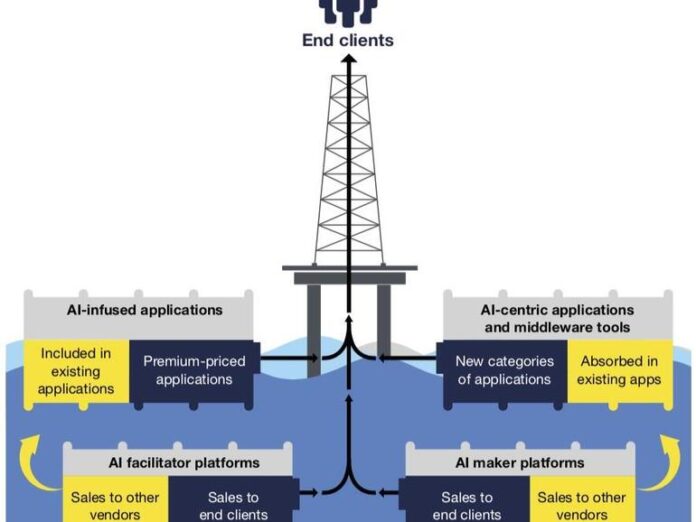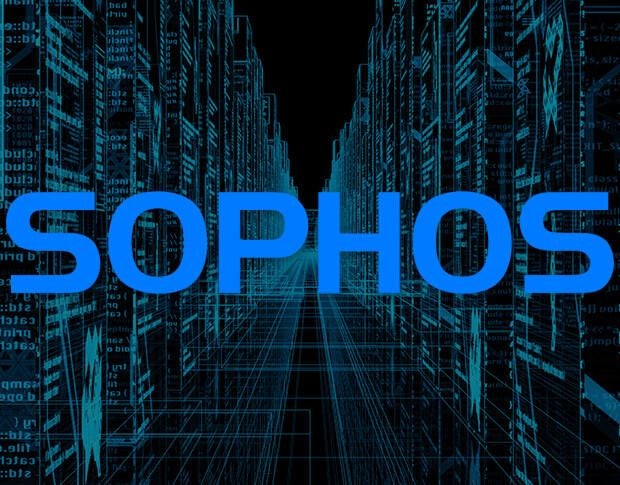Forrester organizes artificial intelligence software into four buckets to get a more reality-based understanding of the market size through 2025.
A new analysis from Forrester breaks down the AI software market into four categories to get a more accurate estimate of the growth potential for the category.
Image: Forrester
Artificial intelligence is being absorbed into existing software products as this functionality becomes a standard feature instead of a special capability. This means that the overall category will be smaller than what some analysts are predicting, according to a new report from Forrester. “The AI Software Market Will Grow to $37 billion globally by 2025” explains why AI platforms will have the advantage in the long run, despite fast growth in AI-infused apps in the short term. Estimates for the size of this market by 2025 range from $390 billion from Grand View Research to $126 billion by Tractica. In the report the Forrester authors note that investors and other analysts have projected that the AI software market will be anywhere from $150 billion to $200 billion in the next five years.
As part of this report released Dec. 10, 2020, Forrester analysts Andrew Bartels and Mike Gualtieri asked their colleagues to estimate how many vendors they track include AI functions in their products. The results reinforced the idea that AI is becoming part of existing products instead of growing into its own category:
- 33% said almost all vendors are adding AI in existing products
- 29% said most vendors are doing this
- 20% said a majority do so
The analysts note that most of AI’s potential value is still implicit rather than countable and attributable: “Most applications are adding AI functions without monetizing them—and the custom-built AI applications that businesses create don’t generate market revenues.”
To understand the real market size of AI software, the Forrester analysts organized the software into two broad groups: A platform category that includes software that companies use to build their own AI applications; and a tools and apps category for products that use AI to improve business outcomes for specific tasks or verticals. The analysts created two buckets for each group and then organized each vendor into one of the four segments:
- AI maker platforms for general purpose algorithms and data sets
- AI facilitator platforms for specific AI functions like computer vision
- AI-centric apps and middleware tools for specialized tasks like medical diagnosis
- AI-infused apps and middleware tools that differentiate through the advanced use of AI in an existing app or tool category
In this analysis, Bartels and Gualtieri defined the actual revenues that vendors receive from selling AI-specific solutions instead of the revenues of vendors that may include AI functions in their existing products at their existing prices. This analysis also excluded hardware and consulting services.
Bartels and Gualtieri predict that the overall AI software market will grow up to $37 billion by 2025. The report authors see the most potential in AI maker and facilitator platforms as the group with the most growth potential, thanks to the large data sets powering these platforms and the opportunity to sell to both clients and other software vendors. Forrester predicts that AI facilitator platforms will reach $8 billion by 2025 and that the maker platforms will reach $13 billion for a total of $21 billion. The apps category will have the most growth over the next three to four years, the analysts predict, with that segment reaching $16 billion. At that point, the apps category will start to lose steam and the platform category will take the edge.
In the apps category, vendors will lose the ability over time to charge a premium for AI-infused apps as this functionality will become a standard feature. The analysts also predict that software companies that provide a suite of tools will absorb these specialized tools like fraud management or medical diagnosis tools.
Also, the analysts predict that AI software will be mostly middleware starting in 2023 and rising to 11% of all sales of the broader middleware market.
Finally, implementing AI comes down to the familiar question of build or buy. The analysts conclude that the answer is both. Build is the best choice if competitive differentiation, time-to-market, and industry-specific needs are top priorities. Buy works best if a company selects a vendor that can use a broad data set to train the algorithms, which ideally includes anonymized and aggregated data from all or most of its customers, according to the report. The analysts note that custom-built AI services are more expensive and have a higher risk of failure.





